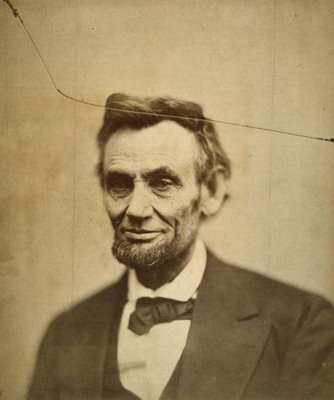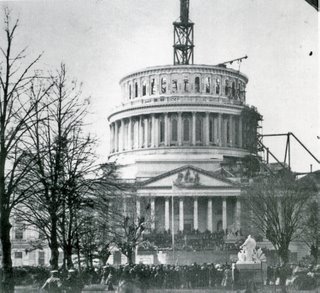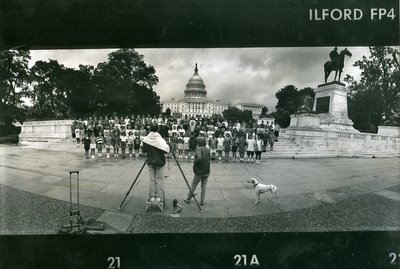No Streaming Video Of Abraham Lincoln In My Head
Wednesday, January 21, 2009

Yesterday my wife lept from the 20th to the 21st century in bed. She watched Obama's swearing in ceremony as streaming video on the NY Times with her Toshiba laptop. I did my best to read the hard copy version of the paper while juggling a large mug of strong tea. Last night after she returned from a computer class she immediately turned on the TV to see what Michelle Obama's ball gown looked like.
I had this curious feeling that I did not want to listen to Obama make yet one more speech. Yet there I was as he made one, so out of context, between dances while his wife behind him was waving acknowledgment to friends. It seems this guy could even give a speech while barbecuing.
Ubiquity of Obama's face and voice has done me in. I gave it some thought last night and came to the realization that Abraham Lincoln and even Ulysses Simpson Grant seem to be so much more real in the b+w images that I have in my mind of them as oposed to all those streaming colour videos of Barack Obama. Ubiquity is making him invisible to me. Or at the very least when he turns his face to one side while speaking (which projects seriousness and the weight of pathos) I feel I am watching a Bugs Bunny cartoon. This is not in any way a feeling of disrespect. Much to the contrary I hold much hope that finally we (as in the world) have an intellectual in the White House who is known for reading books. As my Canadian Tire flyers point out, "Now, that's different!"

My reaction to streaming colour is perhaps the effect of that special moment in my life when I was around 8 when I went to an American library in Buenos Aires and gazed on my first photographs of American Civil War soldiers taken by Matthew Brady, Timothy O'Sullivan and Alexander Gardner. The sharp and stark b+w images made the man I stared at look like their pictures had been taken days or hours before. Then it sank in (my first intimation of my own mortality) that these men had been dead for almost a century. These were the first photographs of real people that I really ever seen. That impression has remained to this day.
Photographer Alexander Gardner took that glass plate portrait of Lincoln with the crack (ominous in retrospect) on February 5, 1865 less than two months before his assassination. The portrait of Grant, it has a startling modern look to it, I found, with no credit and undated in my book My Brother's Face - Portraits of the Civil War In Photographs, Diaries and Letters by Charles Phillips and Alan Axelrod, Chronicle Books San Francisco, 1993.
What is even more startling and endearing, too, is what Grant wrote of his meeting with Lee to accept his formal surrender at Appomattox:
When I went into the house I found General Lee. We greeted each other, and after shaking hands took our seats. I had my staff with me, a good portion of whom were in the room during the whole of the interview.
What General Lee's feelings were I do not know. As he was a man of much dignity, with an impassible face...his feelings... were entirely concealed from my observation; but my own feelings...were sad and depressed. I felt like anything rather than rejoicing at the downfall of a foe who had fought so long and valiantly and had suffered so much...
General Lee was dressed in full uniform which was entirely new, and was wearing a sword of considerable value...In my rough traveling suit...I must have contrasted very strangely with a man so handsomely dressed, six feet high and of faultless form...
We soon fell into conversation about old army times... Our conversation grew so pleasant that I almost forgot the object of our meeting.

In one of my many visits to Washington DC, this one in 1965 I happened on a scene where a photographer was using an old Cirkut 5x7 inch swivel lens panoramic camera to photograph a group. The photographer, James E Ivey had inherited the exclusive franchise and the camera from his father. At the time Ivey was there almost every day of the week with his Dalmation. On the far right the man on the equestrian statue is Ullyses S. Grant. It was June and when I walked up the capitol steps I could smell the fragrance coming from a huge Magnolia grandiflora or Southern Magnolia and I wondered if Abraham Lincoln had ever stopped to smell them, too.
The picture above of Lincoln's inauguration was taken March 4, 1861 by Montgomery C. Meigs. This year I plan to find, buy and read The Personal Memoirs of Ulysses S. Grant.






